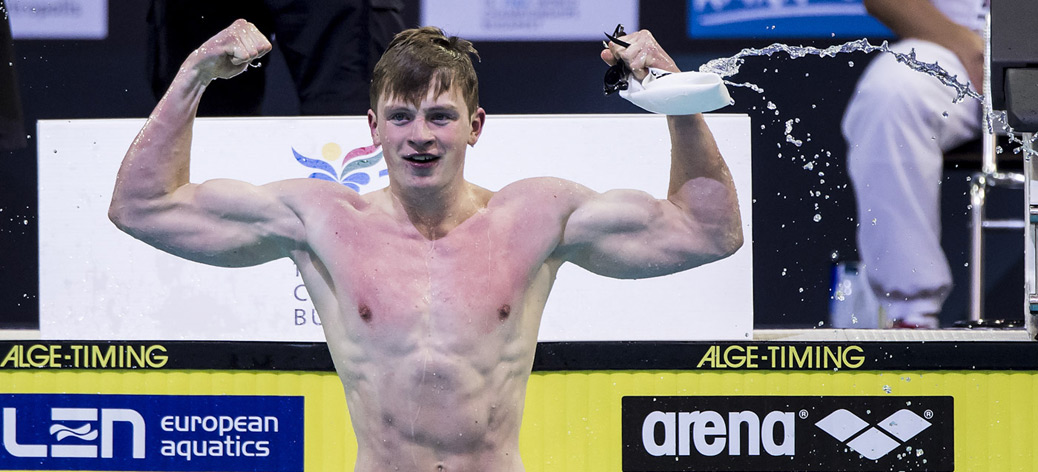Twenty four medals in the pool in Berlin tell their own story – this was quite a performance from Britain’s swimmers at the European Championships. Topping the medal table by a street and securing the best ever medal return at this level made it the perfect cherry on top of the cake baked at the Commonwealth Games.
The Europeans clearly do not have the depth of the Olympics or the World Championships, but this was no walkover of a meet. When you consider the swimmers Europe has at its disposal the medal haul, particularly the 9 gold, is indicative of high British quality not low European standards. And it could have been even better; it’s not unreasonable to suggest that Hannah Miley, James Guy, Michael Jamieson, Siobhan-Marie O’Connor and the men’s 4 x 200 freestyle relay could all have won medals had illness and the need for rest not taken over.
For some it was simply a case of carrying on where they left off in Glasgow. Jazz Carlin was imperious in her 800m freestyle as she left Mireia Belmonte (not a bad rival) for dead at 650m, then repeated the trick with a tactically superb swim to take 400m gold and a new PB. Chris Walker-Hebborn reinforced his new-found mental strength, improving through the rounds to take 100m backstroke gold then snatching 50m bronze in a new PB. There were also impressive performances from Francesca Halsall in the 50m free – racing the swimmers around her not the clock to take gold – and surprisingly the 50m backstroke where she touched out her Loughborough team mate Georgia Davies for gold.
If the senior squad members stole the bulk of the medals, there was still encouragement in the performance of the more junior members. Jay Lelliott nicked bronze in the 400m with a classic outside smoke swim from lane 1, while he and Stephen Milne both cracked 15 minutes for the first time over 1500m. Meanwhile Molly Renshaw delivered on the potential she has shown since her international debut in 2011, delivering a killer last 50m in the 200m breaststroke to break Kirsty Balfour’s British Record – the longest standing women’s mark in the books.
But the best junior performance, and we need to call it that given he’s still only 18, came from Adam Peaty. Having seen off the best of the Commonwealth over 100m breaststroke he duly dispatched the best of Europe – making them look positively pedestrian at times. He then doubled up, where he had narrowly missed out in Glasgow, setting a world record in the 50m breaststroke semi-final, then having the presence of mind in the final to recover from a poor start and power through for gold.
The meet finished exactly as the Commonwealths had – a British male freestyler holding off a charging rival to take gold in the medley relay. Once again he had been given a virtually unassailable lead by his colleagues, not least by Adam Barrett on fly who seems to grow an outboard motor when it comes to relays, but this time it was Ben Proud rounding things off in lieu of the absent Adam Brown.
The comments of the silver medal winning French team afterwards reinforced the target that is now firmly on Peaty’s back “We knew that the breaststroke part would be key to this relay” said Fabian Gilot, who had been given the task of reeling in Proud. “Great Britain has a very strong man in Adam Peaty.” Peaty will need to learn how to deal with the favourite tag next year, no longer the hunter but now the hunted.
But where to go from here? The attitude of the team both in Berlin and in Glasgow has been so different from that we saw in London and Barcelona. They seem much better equipped to deal with the pressures of championship swimming, with far more evidence of fast heats leading to faster semis and finals that we have seen for a long time. The tight races also went Britain’s way in contrast to London where they often ended up in 4th and 5th placed finishes; Renshaw’s effort or Roberto Pavoni’s last gasp battle for bronze in the 200IM symptomatic of a racing instinct that has been honed by greater exposure to the international scene this year.
Backing this performance up next year in Kazan will be tough, just as the trip from Budapest and Delhi to Shanghai was, and expectations will now be raised, possibly higher than they were in 2010. The key now is to maintain the upward trajectory in Russia and not stall heading into Olympic year.
Banner image courtesy LEN/Deepbluemedia

